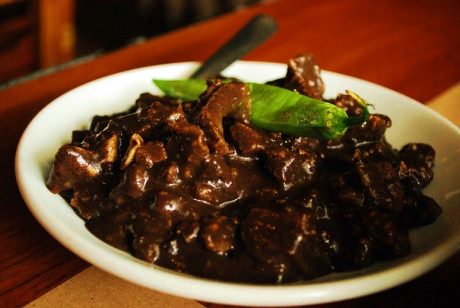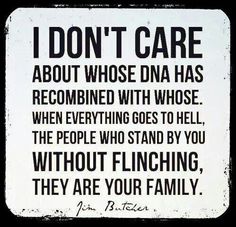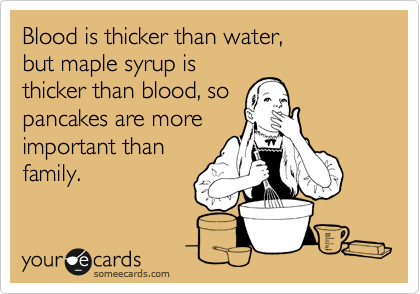Filipino society continues to have this fixation on bloodlines. For example, we are fixated on finding out whether famous people in other countries have Filipino blood, and vice versa. When someone is abusive or bad-habited, we assume that it is in the blood and that people who are related (like children) will absolutely be the same. Some Filipinos claim to be the descendant of some hero, like Rizal or Bonifacio, so they imply that they should be treated like heroes too because they have “the blood of heroes.” When we see other Filipinos (or even half-Filipinos) making great achievements or wins, free-riders attribute it to Filipino blood, which is one of the key rationales behind Pinoy Pride. Mooching on their fame is one thing, but the belief that greatness comes naturally from blood leads to arrogant stupidity.
The source of course would be old, often superstitious, ideas on blood. It’s been a belief held in many cultures that things like personality, intelligence, temperament, talents and abilities – and thus, one’s fortune in life – are hereditary. Thus, when people are rich, famous and successful, or become criminal or cursed, they believe it’s really in the blood. It’s what some may term genetic predestination.
This seems to drive some Filipinos’ idea that their blood makes them already great, and that they should get the world to recognize this greatness, instead of work for this recognition. That is exactly what makes Filipinos fail. It makes them lazy and moochers. Filipinos must recognize that this delusion of greatness is pulling them down and that they should work for respect.
No, greatness or a good life does not come naturally with blood. Perhaps material inheritances are the only good things that can be passed down – if one is fortunate enough to have some parents (in line with this, I again cite an article that says entrepreneurs don’t have a gene for success, but are rich kids with safety nets). And before they were passed on, riches were worked for. That’s something the children should understand.
With the help of modern science, we have come to recognize that there is nurture aside from nature, spurring the nature-versus-nurture debate. Yet much research has already been done revealing that many things once thought inborn, such as talent, can actually be taught and trained. In fact, it could even explain many cases of “inborn talent.” The explanation I have is that “talented” people are simply faster in trial-and-error or learning the ropes, basically being self-taught at an early age. And even if some people display aptitudes that seem natural, there’s proof that training can produce the same results (a key, of course, is the person’s desire to learn).
But another area is how we explain how children seemingly take some behavior from their parents. Genetics would account for physical features, but behavior is still heavily debated on. A better explanation for me is that the example is simply observed. If a child sees their father beating up their mother, it can be etched in their mind that this is all right to do. Or the child sees their parents throw their trash anywhere; sometimes, even the parents teach that it’s OK to do so. It is not a genetic tendency. It is more of nurture, and that supports that idea that behavior is more influenced by will, not blood. The same explanation holds for certain people or cultures (such as Chinese or Jews) tending to be adept business people. They simply teach their principles to their children, and their cultures (which are artificial, not a product of blood) facilitate it.
Perhaps people are still transfixed on something good passed in blood because in reality, heredity does pass on some things, but in a negative way. Among the things that are really passed down are diseases and disorders, such as diabetes, mental disorders and susceptibility to heart disease. In some societies, debt can be passed down from parent to child. Societies have burdensome responsibilities and obligations that are sometimes forced on children who are not given a choice.
That saddens people. What they want is for talents or riches to be passed to them – so they won’t need to work. Unfortunately, reality does not always happen that way, so they complain “life is hard.” But that’s how it really is. They have to accept that life isn’t fair. It isn’t all riches and glory, and they should just work for their keep.
Well, there is this thing Gogs said: Some people are born better looking than others. But where is the contest in that (referring to beauty contests)? Yes, life isn’t fair.
But there is another thing that is detrimental about beliefs in blood: the belief that blood determines we can’t change – and should not. For example, when a father is a thief, belief in blood dictates that the son will be a thief. So other people will treat him like he was a thief, even if he never stole. They might even prod him to be a thief like this father – and thus the responsibility for his becoming a thief if it happens is on their shoulders too. But when he doesn’t, they rile at him for being disobedient of their expectations. The other side is a rich heir whose father worked as an architect. With the father dead, the son becomes arrogant and claims he has the talent of his father by blood. So he works as an architect, too – but he actually hates it and makes terrible and faulty designs. He fails in the business. He becomes a drunkard and womanizer – which his father never was – and he depletes the family fortune. He wonders why his blood failed him. But no, blood was never the factor here. Blood is nothing because a person’s will is their own.
Another thing: if someone asks what’s wrong with believing one’s blood is superior, I only need to mention one word: Holocaust.
We have to drop the beliefs that perpetuate fixation on blood. Thye are not empowering, they are entrapping. Instead of empowering ourselves to believe that we can achieve what we need to no matter our blood, we depower ourselves with the belief that our blood determines what we are and that we arestuck there. This is used to block meaningful change and maintain status quo.
The right belief is that human will is above all blood, and when one wants to change and do better, they can do it.
Oh, I did forget one good thing that should be passed down. And that is wisdom. Anything else passed down or supposedly given through blood will be useless if the person does not have the wisdom to use it properly.
And yet another thing: the saying “blood is thicker than water.” Filipinos often believe in this, meaning blood relations are more important than friendship or dealing with people outside your social circle (such as the infamous KKK of the 2nd Aquino administration). We can consider this a key component of the clannishness and parochialism of Filipinos.
However, as explained elsewhere, the saying is actually a mistake. The original saying is “The blood of the covenant is thicker than the water of the womb.” It means the opposite of the mistaken version: friends or other people, even those you don’t personally know, who are willing spill blood for you are more important than those who share your blood, but would leave you to rot! That supports yet another of my ideas: a healthy society is based on being respectful and decent toward even people you don’t know. If people look only after their own and only those they know, that produces the divided, self-entitled and conceited society we have today.
Filipinos have to drop “blood is thicker than water,” and instead adopt better sayings, such as:
And for a little humor:





No comments:
Post a Comment